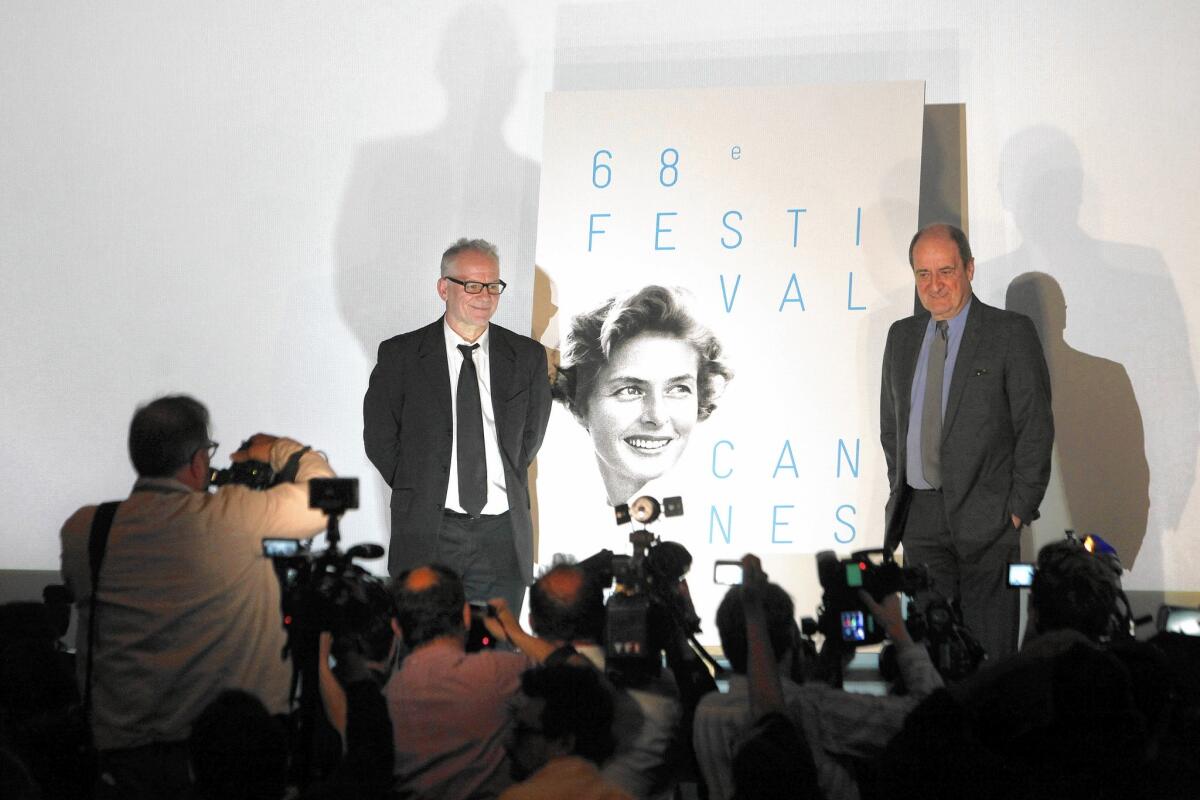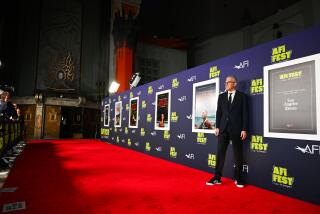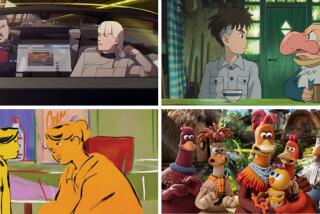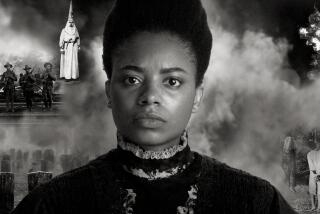Cannes film festival slate offers occasion for parsing

Whether you call it “the Olympics of cinema” (for more bloodsporting types) or “the world’s most prestigious movie gathering” (for the more genteel among us), the Cannes Film Festival is the most scrutinized of cinema confabs.
Long before the films are screened, the lineup is dissected with the intensity of a presidential campaign. Which directors and countries make it in, which section of the festival a film lands in, what movies are left out and why they’re left out are all matters of no small amount of pundit hand-wringing and palm-reading. After all, as with the coastal Riviera social scene, where you are is as important as who you are.
The 2015 Cannes slate, announced Thursday by festival director Thierry Fremaux at his traditional Paris press conference, offered plenty of such areas of inquiry.
For one thing, there was the country question.
Cannes can be a litmus test of which nations are on the rise and which folding like a good crepe, and Thursday proved no exception. Of the 16 films revealed for the coveted main competition category, nearly half were from just two countries — France and Italy.
The host nation will be represented by four films, including the grit-auteur Jacques Audiard’s “Dheepan,” and “Mon Roi,” the latest effort from the single-monikered Maiwenn (winner of the jury prize in 2011 for “Polisse”). That’s on top of another French movie, Emmanuelle Bercot’s French-language “La Tete Haute,” opening the festival out of competition. Is that a function of a new French ferment, the conversation went, or just the right stars for the festival’s red-carpet needs?
Italy, meanwhile, will send three delegates: Matteo Garrone, Nanni Moretti and Paolo Sorrentino, the latter returning not 15 months after winning the foreign-language Oscar for his previous Cannes movie “The Great Beauty.”
At the same time, the absence of any Spanish-language film in competition caused plenty of consternation in Madrid and Buenos Aires, as evidenced by the Spanish-language journalist who gave a que tiene to Fremaux at the post-announcement press conference. (Fremaux said that a Spanish-language film may yet be tacked on to the main competition; the festival does leave room for 11th-hour additions.)
A similar puzzling absence, incidentally, befell a French director--Arnaud Desplechin, whose much anticipated “My Golden Years,” a prequel to his 1996 hit “My Sex Life…or How I Got Into an Argument,” was missing.
There had been reports that Desplechin was offered the opening slot for the prize-eligible but lower profile Un Certain Regard section and turned it down. But far from explaining matters, that only raised further questions — why wasn’t he offered a main competition slot? Was it him or was it the movie? Fremaux left open the possibility that “My Golden Years” could be added to the competition at the last minute. That, of course, set off more chatter.
For their part, the typically strong Brits had a meek showing — only one movie from their nation made it in, as the British production of “Macbeth” with Michael Fassbender (but directed by an Aussie, Justin Kurzel) will be in competition.
And the American filmmakers? They acquitted ourselves reasonably well. The two movies in competition--Gus Van Sant’s suicide drama “The Sea of Trees” with Matthew McConaughey and Todd Haynes’ period lesbian tale “Carol” with Cate Blanchett and Rooney Mara--meant a drop from the high of four a couple years back but were still a respectable number.
The selection of Haynes in particular generated much cheering in U.S. cinema circles. The indie filmmaker hadn’t been to the Croisette since he brought “Velvet Goldmine” there 17 years ago, and the fact that he was offered a slot for “Carol” was, to many, an encouraging sign for him, his movie and even the state of American arthouse cinema.
Van Sant, meanwhile, was something of a question mark coming in because his last Cannes visit, in 2011 with “Restless,” earned him a berth only into Un Certain Regard and was not warmly received; the admission of “Trees” to the main competition seemed to signal brighter times.
And Woody Allen’s “Irrational Man,” a darker existential piece starring Joaquin Phoenix will screen out of competition. The movie almost certainly would have been in competition, but Allen prefers to stay removed from the awards game.
If there won’t be more American films competing for prizes, it’s in part the result of some specific fest decisions. Two big-budget animated films — Pixar’s “Inside Out” directed by Pete Docter and the international production “The Little Prince” from “Kung Fu Panda” director Mark Osborne — were placed out of competition, as was Natalie Portman’s directorial debut, a period Hebrew-language film titled “A Tale of Love and Darkness.”
Portman well could have been in Un Certain Regard, but Fremaux said he decided not to put her there because in past years, when he’d included movies directed by North American actors like Ryan Gosling and James Franco, he heard cries of celebrity favoritism. So a large number of Yanks will get their place on the Croisette, but not on the awards podium.
Countries weren’t the only realm in which observers were reading tea leaves.
There were some notable choices in the format and genre choices too. The festival has been very selective, and then some, when it comes to documentaries, as most don’t end up with high-profile slots. (The ones that do tend to have a political component: Michael Moore films and last year’s “Red Army,” for example.)
That’s why it was surprising that “He Named Me Malala,” Davis Guggenheim’s documentary about Nobel Peace Prize winner Malala Yousafzai, was nowhere to be found. One doc did land a reasonably high-profile slot--”Amy,” Aasif Kapadia’s movie about Amy Winehouse, showing in a midnight section.
Meanwhile, Cary Fukunaga’s “Beasts of No Nation,” a gritty narrative feature about child soldiers that had been tipped as a strong Cannes contender, was omitted. The film has been acquired and will be released by Netflix, and it was reasonable to wonder if either the company’s non-theatrical strategy (Cannes executives are strong supporters of big-screen showings) or its lack of longstanding relationships with a festival built on same partly dinged its chances.
Still, for all the fun that observers have in this spring rite of slate slicing, some caveats apply.
Inclusions are not always reflective of a great national-cinema ferment, while absence are not always mysterious.
“A lot of things are said at the outset — that this movie will be at Cannes or that movie will be at Cannes when there’s never a question of this film being in Cannes,” Fremaux said. “In some cases the movie isn’t even made yet.”
Numerous factors having to do with red carpets, actor scheduling, director make-goods and other less aesthetic concerns also often come into play. So does coincidence. The three Italians in competition, for instance, are all returnees — they just rarely finish movies in the same year.
Even those so-called Italian movies, it should be said, aren’t so Italian. Moretti and Garrone’s films — titled “Youth” and “Tale of Tales” — are English-language efforts filled with stars from countries further west such as Rachel Weisz and John C. Reilly. At Cannes, the lessons aren’t always clear. Even national boundaries can be even murky.
Twitter: @ZeitchikLAT
More to Read
Only good movies
Get the Indie Focus newsletter, Mark Olsen's weekly guide to the world of cinema.
You may occasionally receive promotional content from the Los Angeles Times.







